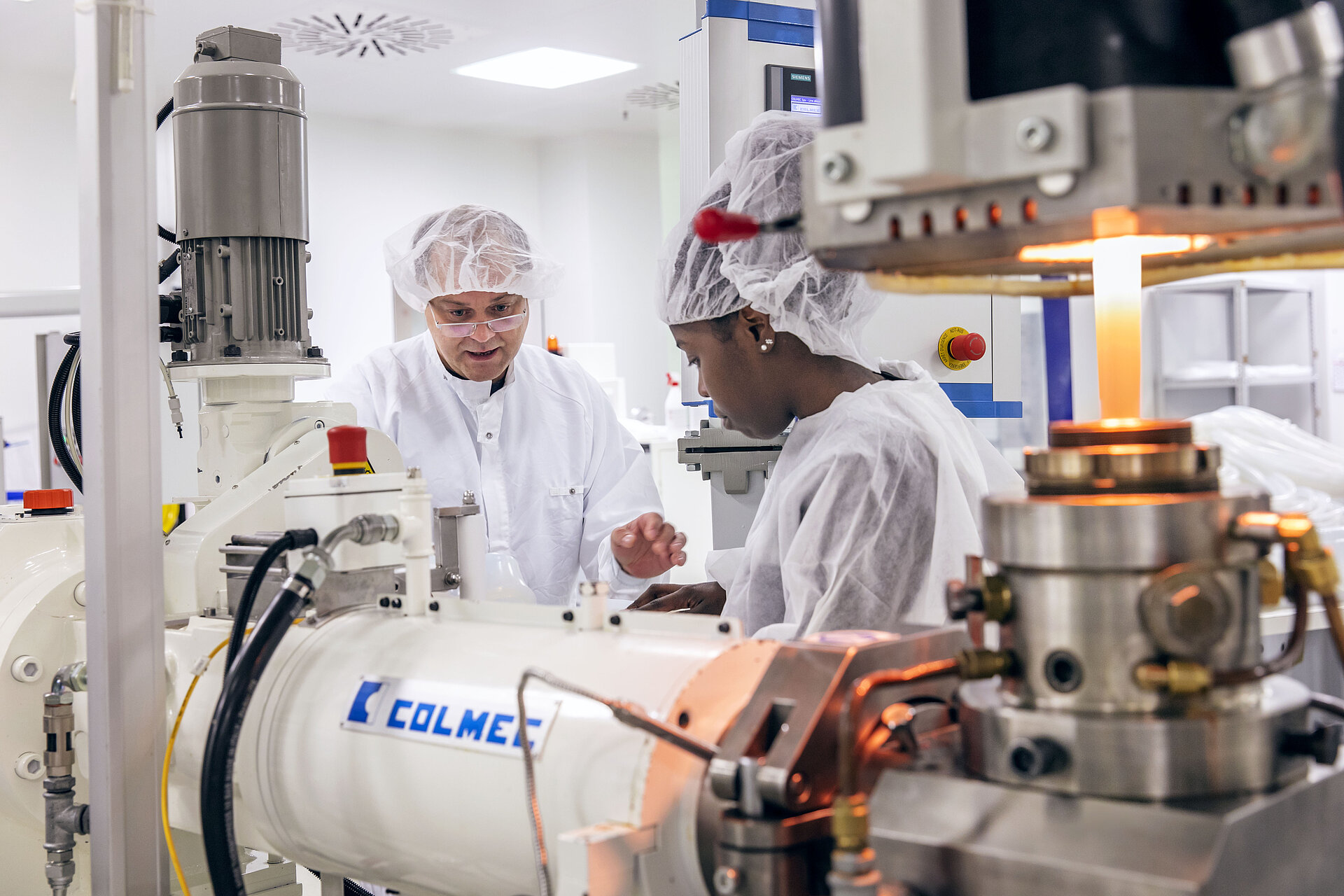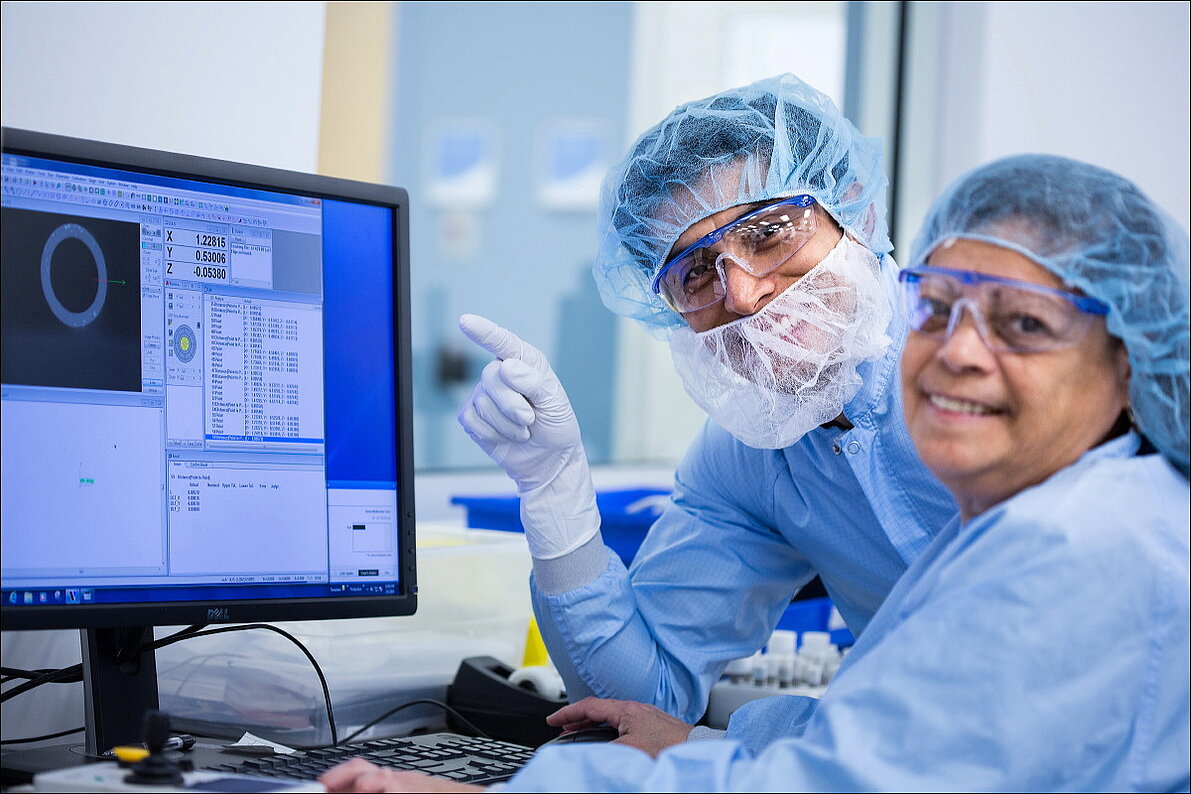Medical - Helix iMC
Highest precision with innovative measuring technology
Silicone tubing can save lives – as an example it is a key component in pacemakers. The Helix iMC technology is revolutionizing current industrial standards for quality control with comprehensive monitoring and documentation. At the same time, it reduces scrap by more than 25 percent.
Some immediately think of the Californian IT industry when they see the word silicone – and others have bathroom joints in their minds. Because the material is a true all-rounder – depending on the mixture and manufacturing process – the silicone spectrum ranges from simple trivets to the sophisticated development of artificial heart valves.
Silicone is also used in cancer drug delivery systems, implants and other technologies that save lives and improve the quality of life. The Freudenberg Medical Business Group manufactures such medical products for use in and on human bodies. Silicone is very important for such products thanks to its compatibility with the human body (biocompatibility).
The Kaiserslautern site in Germany is Freudenberg Medical’s competence center for medical silicone products. Silicone tubes with diameters ranging from 0.3 millimeters to a good five centimeters are manufactured in Class 8 clean rooms for pacemakers or pumps for the pharmaceutical industry. Each year, some 100 tons of silicone tubing leaves the site for customers.
Helix iMC sensor technology

Freudenberg Medical employees in the silicone tubing production area.
Medical application products must meet specifications to within hundredths and thousandths of a millimeter. The inner diameter of a silicone tube is the measure of all things. All deviations must be sorted out and disposed of. Once cured, silicone cannot be remelted and reused, as is possible with the plastic PET. So, the Freudenberg Business Group is adopting the approach of avoiding waste during production.
This is where the new Helix iMC sensor technology from Freudenberg comes into play. Freudenberg specialists in Kaiserslautern spent a year and a half developing the technology and have been using it on one of two production lines since April 2019. The unique innovation reduces waste and its environmental impact by more than 25 percent. It will now be rolled out step-by-step at all Freudenberg sites that produce tubing. In Kaiserslautern, it has already decreased non-recyclable cured silicone waste by around two tons. This equals over 1.5 tons of CO2. If the technology is adapted to other production lines and Freudenberg Medical sites, savings can be made around the globe.
Helix iMC uses a tomographic system with an emitter and four sensors. They record and document the tube’s shape during extrusion. An algorithm calculates a cross-section view using these measurements that an employee can monitor on a screen. In addition to visual monitoring, the system automatically reports any deviations that it detects, making a precise and continuous measurement of the inner diameter and wall thickness during the production process possible.
This is a revolution over the industry standard that uses cut samples of cured silicone tubes measured manually during production. The process is repeated until the product meets specifications. The production line keeps running throughout the process. If the material does not have the right configuration, it must be scrapped. For tubing with complex geometry, the process is time consuming and material intensive. One example is the multiple lumens from Freudenberg Medical that insulate pacemaker wires with five internal diameters where the minimum wall thickness is the most important dimension.
Especially at the start of a new production run, the old method still generates waste. But any deviations, even during production, mean scrapping an entire production batch. Helix iMC immediately detects and flags deviations and errors in the production process, allowing employees to intervene and have the process return to the defined parameters.
Comprehensive monitoring and documentation
The new technology increases product quality and drastically reduces processing time and scrapped material. Using artificial intelligence, any deviation in the production process is now detected without delay and automatically corrected.
So the innovation helps market vital precision medical products even more quickly, while saving resources and protecting the environment.
